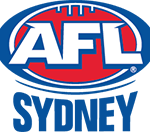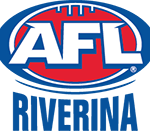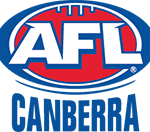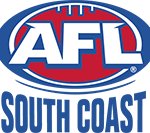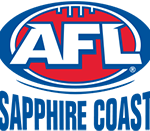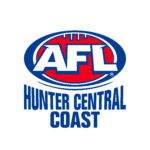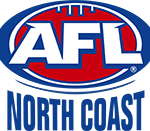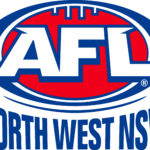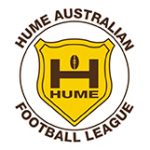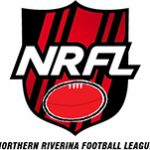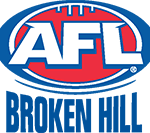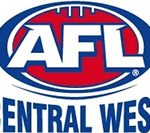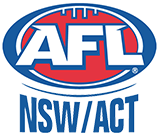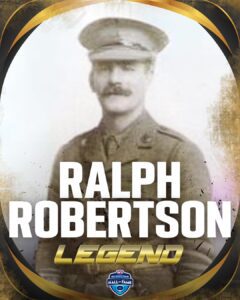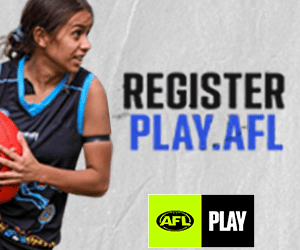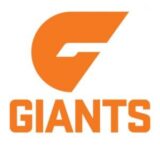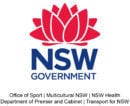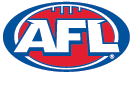.
Australian rules football has been played in NSW since the early 1880s. Its more than 140 years have been full of champions, trailblazers and characters and the NSW Australian Football Hall of Fame recognises those who have given our game so much in this state.
The NSW Australian Football Hall of Fame was unveiled in 2024, with 100 people inducted.
According to its charter, the purpose of the Hall of Fame is to:
“Recognise and enshrine players, coaches, umpires, administrators, volunteers and media representatives who have made a most significant contribution to the game of Australian Football in NSW since its inception in 1880.”
.
100 inaugural NSW Australian Football Hall of Fame inductees
| Name | Category | Era | Region |
| George Crisp | Player/Admin | 1880-1892 | Sydney |
| Phillip Sheridan | Admin | 1880-1892 | Sydney |
| Jim Phelan | Player/Admin | 1880-1925 | Sydney |
| Harry J Hedger MBE | Player/Admin | 1881-1910 1903-12 | Sydney |
| Ralph Robertson | Player | 1903-14 | Sydney |
| Chris Lethbridge | Player/Coach | 1913-22 | Sydney |
| Stan Milton | Player | 1919-1940 | Sydney |
| Sir Doug Nicholls | Player | 1922-1947 | Murray |
| W R “Billy” McKoy | Player | 1924-35 | Sydney |
| Frank Dixon | Player/Coach | 1926-62 | Sydney |
| Jimmy Stiff | Player | 1929-1935 | Sydney |
| Stan Powditch | Player | 1929-1943 | Sydney |
| Wilbur (Bill) Mohr | Player | 1929-41 | Riverina |
| Gordon Strang | Player | 1931-36; 1938 | Murray |
| Haydn Bunton | Player | 1931-37; 1942 | Murray |
| Jack Williamson | Player | 1932-1941 | Sydney |
| Ken Ferguson | Admin | 1934-1969 | Sydney |
| Syd Felstead | Player/Admin | 1938-1974 | Sydney |
| Bill Elliott | Admin | 1940-1950 | HCC |
| Jack Armstrong | Player/Coach/Umpire | 1944-1978 | Sydney |
| Jack Dean | Player/Coach/Admin | 1945-1980 | Sydney |
| Ray Tunbridge | Player/Coach/Admin | 1945-1990 | South Coast |
| Garry O’Connell | Player/Coach/Admin | 1945-2000 | Hume |
| Jim & Edna Daniher | Player/Coach/Admin | 1946-2006 | Northern Riverina |
| Bill Hart | Administrator | 1946-78 | Riverina |
| Jack Luhrs | Media | 1948-1990 | Riverina |
| Harry Gardiner | Player/Coach/Admin | 1949-1970 | Hume |
| Bert Schmidt | Media | 1950-1980s | Riverina |
| John Yates | Admin | 1950-2004 | Riverina |
| Ossie Grose | Player | 1950-60s | Sydney |
| Bill Barton | Player/Coach | 1952-1978 | Hume |
| Stan Hague | Player/Coach/Admin | 1952-2005 | Northern Riverina |
| Mervyn Wegener | Player/Admin | 1953-2009 | Hume |
| Ellis Noack | Player | 1953-80 | Sydney |
| Peter Carroll | Player/Coach/Admin | 1954-2005 | Hume |
| Lindsay Norman | Player/Admin | 1954-2007 | Hume |
| Brian Lenton | Player/Coach/Admin | 1956-2019 | North West |
| Allan Jeans | Player/Coach | 1961-1976 | Murray |
| Tom Carroll | Player | 1961-63 | Riverina |
| Ian Granland OAM | Admin | 1962-current | HCC |
| Sid Robins | Player | 1963 – 1980 | Riverina |
| Ross Elwin | Player/Coach | 1963 – 1997 | Riverina |
| Lionel Johnston | Admin | 1964-2013 | Broken Hill |
| Ted Ray | Admin | 1965-2005 | Sydney |
| Doug Priest | Player/Coach/Admin | 1965-75 | Riverina |
| Keith & Paula Rees | Player/Coach/Admin/Umpire | 1966-2019 | Northern Riverina |
| Rick Quade | Player | 1967 – | Riverina |
| Bert Haynes | Player/Coach | 1967-1993 | Riverina |
| Laurie Pendrick | Player | 1970 – 1990 | Riverina |
| Greg Harris | Player/Coach | 1970-1997 | Sydney |
| Greg Verdon | Player/Admin | 1970-2009 | Riverina |
| John Sullivan | Umpire | 1970-2019 | HCC |
| Ross Henshaw | Player | 1921-1983 | Hume |
| Mark Rendell | Umpire | 1973-2003 | Sydney |
| Rod Gillett | Admin | 1974-2019 | North Coast |
| Mark Maclure | Player | 1974-86 | Sydney |
| Rod Carter | Player | 1974-90 | Sydney |
| Kevin Taylor | Media | 1975-1995 | Sydney |
| Wayne Walker | Player/Coach | 1975-2002 | Broken Hill |
| Peter Johns | Player/Coach/Admin | 1975-92 | Broken Hill |
| Terry Daniher | Player/Coach | 1976-95 | Northern Riverina |
| Neale Daniher | Player/Coach | 1978-2007 | Northern Riverina |
| Neil Cordy | Player/Media | 1979-93 | Sydney |
| Rod Podbury | Player | 1980-93 | Sydney |
| Anthony Daniher | Player | 1981-1997 | Northern Riverina |
| Chris Daniher | Player/Coach | 1981-2018 | Northern Riverina |
| Dennis Carroll | Player | 1981-93 | Riverina |
| Alan Simpson | Admin/Umpire | 1983-2019 | Sapphire Coast Football League |
| Greg Wollaston | Player/Admin | 1983-2019 | Sapphire Coast Football League |
| Tony Lockett | Player | 1983-99 & 2002 | Sydney |
| Geoff Day | Player/Admin | 1984-2018 | Central West |
| David Murphy | Player/Coach | 1984-2020 | Murray |
| Shane Lenon | Player/Coach | 1985- | Riverina |
| Craig Davis | Player/Admin | 1986-2007 | Sydney |
| Tim Beard | Umpire | 1987-2016 | Riverina |
| David Boulton | Umpire | 1987-present | Sapphire Coast Football League |
| Jim & Jill Woodlock | Admin | 1987-today | North Coast |
| John Longmire | Player/Coach | 1988-95; 1997-99 | Hume |
| Wayne Carey | Player | 1989-2001 | Riverina |
| Paul Kelly | Player | 1990-2002 | Riverina |
| Maurice Goolagong | Player | 1990-2005 | HCC |
| Christine Burrows | Umpire/Coach | 1997-present | HCC |
| Frank Kalayzich | Admin/Umpire | 1990-pres | Sydney |
| Patrick O’Donoghue | Umpire | 1990-pres | Riverina |
| Richard Colless | Admin | 1993-pres | Sydney |
| Brad Aiken | Player | 1994-current | Riverina |
| Leo Barry | Player | 1995-2009 | Murray |
| Gerry Griffiths | Admin/Umpire | 1997-2016 | North West |
| Yvette Andrews | Player/Coach/Admin | 1999 – current | Sydney |
| Brett Kirk | Player | 1999-2010 | Murray |
| Mark McVeigh | Player/Coach | 1999-2012 | HCC |
| Lenny Hayes | Player | 1999-2014 | Sydney |
| Michaela Freckman | Player/Coach | 2000 – 2020 | Sydney |
| Melinda Hyland | Player/Coach/Admin | 2000-2019 | Riverina |
| Leanne Imrie | Administrator | 2001- | Northern Riverina |
| Tracey Kick | Player/Coach | 2002-2018 | Sydney |
| Jarrad McVeigh | Player | 2004-17 | HCC |
| Jemma Still | Player/Coach/Admin | 2005-current | Sydney |
| Kieren Jack | Player | 2007-17 | Sydney |
| Amanda Farrugia | Player | 2011-2019 | Sydney |
.
Detailed citations of Hall of Fame inductees
1880-1940
George Crisp, 1880-1892
George Crisp initiated competitive football in Sydney by placing an advertisement in The Sydney Mail in 1880 seeking people to come together under “Victorian Rules”. Crisp served as the Treasurer of the Sydney club from 1881 to 1882 and was club captain from 1881 to 1889. Additionally, Crisp was the vice president of the NSW Football Association for several seasons over a 10-year period. Crisp represented New South Wales on 19 occasions from 1881 to 1890, seven of which he was captain including wins over Queensland.
.
Phillip Sheridan, 1880-1892
Phillip Sheridan was the first president of the NSW Football Association, serving from 1880 to 1890. He was highly prominent in sporting circles in Sydney, particularly in cricket where he helped form the Sydney Cricket Club. Sheridan was one of the first trustees of the Sydney Cricket Ground and played a pivotal role in providing the NSW Football Association with access to the SCG during the winter season. There was strong competition for use of the ground with the Southern Rugby Union (SRU), later the NSW Rugby Union.
.
Jim Phelan, 1888-1925
Jim Phelan gave thirty-seven years of service to the game in Sydney. He is credited with steering the Sydney competition through World War One and the financial issues around the demise of the league’s own ground. Phelan was involved in the East Sydney club and the Waratah club before the game’s 1894 collapse; he returned in 1904 to be the inaugural treasurer and secretary of the Newtown club. Phelan was primarily responsible for keeping the game going in Sydney throughout World War I in his role as the league’s secretary from 1915 until 1925. In addition to his skills in administration and acquiring ovals to play on, Phelan was an avid promoter who wrote about football in local publications until his death. In 1937 the first-grade best and fairest medal in Sydney was retitled – the Phelan Medal.
.
Harry J. Hedger, OBE, 1881 – 1894, 1903-1912
Harry J. Hedger was one of most influential football administrators from the time the game was organised in Sydney in 1880, and especially in its resurgence from 1903. He played around 100 matches for various Sydney teams, but it was his effort to get the game in Sydney supported by Victoria that was his legacy. In 1903 he travelled to Melbourne at his own cost to address a VFL meeting, ultimately convincing the VFL to play a game on the SCG, with the gate money raised put towards a new league in Sydney. This kick-started the re-formed NSW Football League, with Hedger as treasurer. Hedger played a total of fifteen matches for NSW including the first-ever intercolonial game against Victoria on the SCG in 1881 and was captain in his final two games against Tasmania at the SCG in 1890. He was awarded the trophy for the competition’s best player in 1888.
.
Ralph Robertson, 1903-1914
Ralph Robertson is one of NSW’s greatest-ever players and played a record 41 times for NSW including wins over Port Adelaide (1907) and South Melbourne (1909). He started his illustrious career with St Kilda in 1899 for two seasons playing before moving to Sydney in 1902 and signing with East Sydney with the reformation of the NSW ANFL in 1903. He captained Easts in 1905-1906 and moved to North Sydney in 1909 where led the red and blacks to the premiership. Robertson captained NSW on 12 occasions between 1904 and 1914, being named among the best in most matches. He was voted NSW’s best player at the 1908, 1911 and 1914 national carnivals. Robertson curtailed his playing career to enlist in the British Army as a lieutenant; he died in a flying accident in World War I.
.
Chris Lethbridge, 1913-1922
Chris Lethbridge is named in the back pocket in the NSW Greatest Team Ever. Originally from Wagga, Lethbridge played for the YMCA club in Sydney in 1912 and was pivotal in NSW’s win over Queensland. Recruited by Fitzroy he played 148 games from 1913 to 1922, bookending his career playing in the 1913 and 1922 premiership teams, and captaining the side in the latter. Lethbridge later became Fitzroy’s coach for the 1925 season where his win-loss ratio was an impressive 12-5. An extract from The Sporting Globe in 1925 described Lethbridge as having a “reputation of being one of the toughest men the game has known”.
.
Stan Milton, 1919-1940
Stan Milton kicked 1361 goals in Sydney football across a 25-year playing career. Milton played 124 games for Paddington (321 goals), 17 games 52 goals for East Sydney, and 183 games for Eastern Suburbs booting 988 goals. He won the Sydney Football League’s goal kicking a record five times – 1922, 1924, 1925, 1927, and 1933. He also represented NSW 26 times, bagging 151 goals. It is said that if he had the appetite, Milton could have certainly played VFL if his 10-goal outing in the Eastern Suburbs’ match against Geelong in 1927 is any indication. The leading goalkicking award in AFL Sydney is named in his honour.
.
Sir Doug Nicholls, OBE 1922-1936
Sir Doug Nicholls has the honour of having the AFL Indigenous Round named after him following a football career which overcame racial prejudices and a life post footy which included being a pastor, an advocate for reconciliation, and serving as Governor of South Australia. Sir Doug was also the first Indigenous Australian to receive an Order of the British Empire and to be knighted. Sir Doug honed his football craft playing for Cummeragunja (1922-24) in what is now the Picola league. Upon moving to Melbourne, he represented Northcote in the VFA from 1927-31 winning two best and fairest awards and collecting a premiership. Sir Doug Nicholls played 54 games for Fitzroy in the VFL from 1932 to 1936 and was the first Aboriginal player to represent the VFL. He coached Cummeragunja in 1939.
.
W R “Billy” McKoy, 1924-1935
Billy McKoy was a wingman from Albury who played for the Sydney club and represented NSW on 31 occasions, often being named as one of the best players on the ground. McKoy won the Provan Trophy (later renamed the Phelan Medal) in 1928 and 1929 and was a runner up in 1930. McKoy also played in Sydney Football Club’s premiership teams of 1925 and 1931. He famously kicked the winning goal over Victoria at Erskineville Oval in 1925.
Frank Dixon 1926-62
Frank Dixon started his football life with Daceyville Waratahs Junior Club in 1926 and won the league’s best and fairest. He transferred to South Sydney in 1930 and played around 150 first grade games including two premierships and two runners-up seasons. Dixon represented NSW on nine occasions and led the state as captain from 1935-37. Post World War II he was elected senior vice president of the Sydney Football League and from 1947-52 he was the head coach of the NSW State team. Away from football, Dixon was Deputy Lord Mayor of Sydney between 1960-1962 and was honoured with the naming of the Trumper Park Grandstand after him for his services to the game.
Jimmy Stiff 1929-1935
Jimmy Stiff’s football career was relatively short but highly impactful. A NSW representative through school, he was selected for the senior state side at age 17. He was easily recognised for his skill and attack on the ball and played ten representative matches for NSW, including the 1933 national carnival, where he was judged player of the tournament – the only NSW player to ever receive such an accolade. Stiff played in two premiership sides with South Sydney (1934 and 1935) and was part of three losing grand final teams. He was tragically killed in a motor cycle accident in 1937.
.
Stan Powditch 1929-1943
Stan Powditch was a prolific goal kicker who topped the Sydney competition goalkicking four times. He played with South Sydney from 1929 to 1933 when he controversially transferred to new club St George. He kicked 46 goals in 11 appearances for NSW in interstate matches including twenty-nine goals at the 1933 carnival where he was pipped for the leading goalkicking award by one goal by Victorian and Collingwood champion spearhead Gordon Coventry. His goalkicking prowess proved pivotal in St George’s first premiership in 1937; “Powder” kicked 114 goals (and only 38 behinds). His final season was in 1943 and he finished with 776 goals from 177 games at an average of 4.38 per game.
.
Wilbur (Bill) Mohr 1929-41
Bill Mohr was a super forward for St Kilda, booting 735 goals for the Saints in just 195 games from 1929 to 1941. He was recruited by the Saints from Federals in Wagga (now known as Wagga Tigers).Mohr was relatively slight standing at 182cm and 80.5 kilograms but his accuracy in front of goal was lauded by all who watched him play. Mohr was one of the first inductees into the Australian Football Hall of Fame and was part of St Kilda’s team of the century having captained the team in 1937 and won two best and fairest awards throughout his career. He was selected as full forward in the NSW Greatest Team.
.
Gordon Strang 1931-36; 1938
Gordon Strang played for Richmond from 1931-36 and then in 1938, but he was first noticed when booting 10 goals for the Jindera Football Club as a 19-year-old in 1927. He managed 98 games in his first stint with Tigers, then spent 1937 as captain coach in North Launceston. Strang returned to Richmond in 1938 to play 18 games and take his career goal tally to 108. Strang was named centre half-back in the NSW Greatest Team as well as in Richmond’s Team of the Century.
.
Haydn Bunton 1931-37; 1942
Haydn Bunton was born in Albury in 1911 and is widely regarded as one of the greatest footballers of all time. Always a precocious talent, Bunton booted four goals in the Albury Rovers’ 1926 premiership and won the side’s best and fairest that year – he was 15 years old. Bunton would play 119 games for Fitzroy, 72 for Subiaco and 17 for Port Adelaide, winning three Brownlow Medals and three Sandover Medals. He is in the Australian Football Hall of Fame and the AFL Team of the Century (forward pocket). Despite his successes at the top level of the sport, Bunton never won a flag in the VFL, WAFL or SANFL, with consecutive premierships at Albury and West Albury from 1926-1929 his greatest team performances. He was a unanimous choice as first rover for the NSW Greatest Team.
.
Jack Williamson 1932-1941
Known as a scrupulously fair player, well-liked by teammates and opponents alike, Jack Williamson was a star of football in Sydney. Born in Kyabram, Victoria, in 1913, Williamson’s family moved to Leeton so he grew up playing football in the Riverina. Williamson found work in Sydney in 1932 as a cabinet maker and signed with Eastern Suburbs. A force at centre half back, he won four Phelan Medals playing for Eastern Suburbs represented NSW on twenty occasions including the 1933 national carnival in Sydney.
.
Ken Ferguson 1934 – 1970
Ken Ferguson dedicated himself to football administration for more than three decades and was known as the heart and soul of Sydney football. Ferguson began his role in football at the South Sydney Club, and he was elected assistant secretary of the Sydney league in 1934 before taking the reins two years later. It was not until his retirement from the railways in 1967 that he was appointed full time League secretary for AFL Sydney before retiring in 1970. He was elected a life member of the NSW ANFL in 1941 and also received an AFL Merit Award in 1955.
1941-1990
Syd Felstead
Syd Felstead had a tremendous impact on football in the St George region of Sydney. He played 128 senior games at St George AFC, but his most significant contributions were off the field. He was President of St George from 1955-1974, ushering an era of strength for the Dragons. He was also instrumental in setting up the junior program in the region. Felstead also secured Olds Park as an AFL venue which today remains one of the city’s most important grounds. He served on the League executive for many years and was awarded an AFL Merit Award in 1963.
.
Bill Elliott
Bill Elliott’s impact on football in Newcastle was so profound the AFL Hunter Central Coast’s Black Diamond Cup competition’s best and fairest bears his name: the Elliot-Davey Medal. He was heavily involved in reforming the Newcastle league in 1948. Elliott was a star captain-coach for Mayfield in the early 1950s and was league secretary during the same period. He was then president of the league in the 1970s and was recognised as maintaining the enthusiasm for the three competing clubs and building momentum for further clubs to return to the league. He was awarded an AFL Merit Award in 1956.
.
Jack Armstrong
Jack Armstrong had a long playing career in Sydney which was complemented by a significant period as an umpire, officiating 105 first-grade matches. He was born and raised in Coolamon but came to Sydney following World War II to the South Sydney Club. He then moved to Newtown and played at Liverpool, winning best and fairest awards at each three clubs across more than 300 games before finishing his playing days as a 47-year-old. He represented NSW on five occasions, is a Life Member of AFL NSW/ACT and the NSW AFL Umpires Association.
.
Jack Dean
In a playing career spanning 20 years, Jack Dean played more than 400 matches including 310 games for Eastern Suburbs, 45 for Sydney Naval, 40 for Ardlethan and 25 for NSW. He was the most dominant ruck of the era and made an impact on the national stage, winning the divisional best player award in matches against Australian Amateurs, Queensland and ACT at the 1958 national carnival. Following his 1966 retirement, Jack Dean was a state selector for 12 years. He was president of Eastern Suburbs from 1970-1982 in a golden era for the club. He received an AFL Merit Award for service to the game in 1977.
The best player each season at UNSW-Eastern Suburbs is awarded the Jack Dean medal.
.
Ray Tunbridge
Ray Tunbridge was a player, coach and effective administrator. He played a key role forming the South Coast league, which commenced in 1969, as well as the Wollongong Lions and Port Kembla senior football clubs. He was also responsible for introducing Australian football into school sporting programs and helping establish six local junior clubs in the Illawarra. Ray is a Life Member of Wollongong AFC, Port Kembla AFC as well as AFL South Coast. The Ray Tunbridge Medal is awarded to AFL South Coast’s best and fairest male player each season.
.
Garry O’Connell OAM
Garry O’Connell committed 70 years of his life to the Hume Football League. He is synonymous with the the Osborne club where he served as president for more than 20 years and held other official roles. During his association with the club, it netted 22 premierships including 17 over the time he led the club. O’Connell also spent seventeen years as Hume League president from 1983-1999. In 1996 he was awarded an AFL Merit Award. He received an Order of Australia medal in 2011 for services to the game. He is a life member of the Osborne club and the Hume league.
.
Jim & Edna Daniher
Jim and Edna Daniher worked tirelessly for football in the Northern Riverina over a 60-year period in a full range of capacities both on and off the field. Jim was a star player, racking up an estimated 400 games for Ungarie between 1946-1973. He played in five premiership teams and was captain for four of them. Jim Daniher was the standout player of his era; he also represented Riverina against Great Britain in rugby league. Edna Daniher was a major support for Jim in his administrative work, managing the correct processes for recording keeping, player clearances and other records. She was a continuous, helpful presence at Ungarie matches even though she and Jim were raising a family of 11. Edna Daniher was awarded the AFL Football Woman of the Year in 2004.
.
Bill Hart
After playing two seasons for St George in 1946-1947, Bill Hart moved to the Western Suburbs club upon its formation in 1948. He then joined the committee in 1954 as secretary, a position he held until 1965. He played a major role in the formation of the Western Suburbs licenced club. and later, as a board member of the NSW AFL, arranged funding for the purchase of its own premises in Chippendale. Hart became President of the NSW ANFL in 1966 and held office until 1978. One of his major initiatives was the introduction of VFL exhibition matches in Sydney in the 1960s to promote stronger interest in the game.
.
Jack Luhrs
Originally from Whitton, Jack Luhrs also played for East Sydney (1947-48) and Griffith (1949-55) but it was his role in the media as a radio match caller and newspaper reporter where he made his name. Luhrs played 100 games for the Griffith Swans including the club’s break-through 1952 premiership win over Whitton. He won the club’s best and fairest award that year. After his playing days, Luhrs served the Swans as a president and on the committee. Luhrs called and reported on games in the MIA from 1955 to 1990 and had a voice instantly recognisable to those in the region.
.
Harry Gardiner
There are few people who will ever play as much senior football as Harry Gardiner, who amassed 546 games, 425 of them for Culcairn. He played in five premierships for Culcairn (1952-54, 1963 & 1968) and two for Jindera (1956-57). Gardiner also coached Rand for three seasons from 1958-60. He also claimed a record four Baz Medals for the Farrer league’s best and fairest player and was twice runner-up. Gardiner was Farrer’s leading goal kicker in 1963 and a multiple best and fairest winner at Culcairn. In 2000 he was awarded life membership of the Culcairn Football Club.
.
Bert Schmidt
Bert Schmidt was “Mr Football” in the Riverina from the 1950s to 1980 during which time he had a profound influence on the game. He called Farrer football on radio 2WG for 20 years from 1958-1977. He was the founding editor of match day programs for the Farrer league and South West league in 1960. He also played a major role in setting up the Riverina Australian Football Club, a licensed clubs founded in 1971 – he was its founding chairman. Schmidt was also a member of the Wagga Australian Football Promotions Committee from 1968-1977 which conceptualised and started for school competitions. The best player in the Farrer league reserve grade grand final is awarded the Schmidt-Nitschke medal.
.
John Yates
John Yates was a highly influential figure in the Riverina, who played 170 games for Yerong Creek and was part of its 1954 premiership team. He was integral to the amalgamation of The Rock and Yerong Creek in 1964 and was a selector and on the club’s committee from 1973-1980. From here, he became president of Farrer FNL from 1981 to 1988 which joined NSW AFL. He was on the NSW AFL Commission from 1988 to 1994 including Chief Commissioner (1991-1998), and a Sydney Swans director from 1994 to 2004. He is a life member of the Farrer League, AFL NSW/ACT and the Sydney Swans.
.
Ossie Grose
When John “Ossie” Grose came to Sydney from Kempsey with his family and settled in Erskineville he had not previously played Australian football. However, his speed, skills and courage enabled him to quickly adapt to the Australian game. A diminutive 5’2” (157cm) rover, Ossie was a key player in the Blood-Stained Angels premiership team of 1942 continuing to play in another three premierships for Newtown between 1945-47 when the club dominated the Sydney competition. Ossie played over 300 games for the Newtown club and represented NSW on twelve occasions including the 1947 national carnival in Hobart and the 1950 carnival in Brisbane.
.
Bill Barton
Bill Barton played 484 matches over a 26-year period in the Hume League, Farrer and Ovens and Murray Leagues. He also managed two matches for North Melbourne, one each in 1955 and 1956. He was a sought-after player and coach starting at Mangoplah-Cookardina, managing to win four premierships over the period from 1967-77 coaching Jindera, Burrumbuttock and Walla Walla, taking his tally to seven across his career. Barton also played plenty of representative football for Ovens and Murray, Farrer – a side he captained – and Hume Football League, for which he was captain and coach.
.
Stan Hague
Stan Hague is a legend in Northern Riverina as a player and a coach. He started with Rand in southern NSW playing for 25 years before retiring aged 44. Moving to take up a farm at Tullibigeal, Hague was appointed non-playing of the Northern Riverina representative coach from 1982-1985; he also coached Lake Cargelligo in 1987. On top of playing and coaching, Hague was an accomplished administrator as the Northern Riverina’s president from 1989 to 2005 and worked tirelessly to keep the league viable. He was honoured with life membership of the Northern Riverina Football League.
.
Mervyn Wegener
Merv Wegener was a giant of the Hume League taking to the field in his first senior match at the age of 16. The early start is a clear indication of his talent, which during a senior career spanning more than 350 matches (302 for Walla Walla) saw him win multiple best and fairest awards. Alongside and following his playing days was a fierce commitment to the health of football, with Wegener working hard in key administrative roles for more than five decades. His positions as president and vice president of the Hume League spanned more than 40 years and he was awarded life membership of the league.
.
Ellis Noack
Across 470 games, Ellis Noack was one of the best and most durable ruckmen to have played in Sydney. He began his senior football at Ariah Park (1953-56) before moving to Sydney where he played for multiple clubs from 1957-1980, including several seasons alongside his sons at Campbelltown. Noack won multiple club best and fairest awards and represented NSW on eight occasions. Clubs he played for included Eastern Suburbs, St George, Newtown, Southern Districts and South Sydney. Following his playing days, Ellis Noack worked in various administration roles for Liverpool and Campbelltown clubs.
.
Peter Carroll
Peter Carroll has virtually done it all for the Coreen Football Club as well as for the Coreen & District Football League. Across 25 seasons and 370 games (1954-1978), he won eight club best and fairest awards, four league best and fairests, and won four premierships including one as coach. He spent 15 years as Coreen’s club president and was the Coreen League President for 18 years. He was a highly respected person in football and was made a Coreen league life member in 1999.
.
Lindsay Norman
Lindsay Norman devoted over fifty years’ service to the Coreen Football league as a player and as an administrator. He played for Daysdale from 1955 including premiership teams in 1961-62-64. His first office bearing role was as Secretary of the Daysdale Football Club from 1959-1966. Following this, he was secretary of the Coreen league from 1977 until the league was disbanded in 2007. Norman was a strong advocate for the Coreen league’s involvement in NSW. His life membership of the Coreen league was honoured by the Hume league in 2009. Norman was awarded an AFL Merit award in 1997.
.
Brian Lenton
A star player in the Riverina with Whitton and in Sydney with Western Suburbs, including playing for NSW, Brian Lenton was named as Western Suburbs’ fullback in its Team of the Century. However, Lenton made his biggest impact on football in NSW in north west NSW. Lenton was the Gunnedah Bulldogs’ inaugural captain/coach in 1977 and coached for 10 of the next 15 years. He won the competition’s best and fairest in 1979. Lenton played a significant role creating the North West league in 1978. He was also a long-term president at Gunnedah and received an AFL Merit Award in 1988. He still does the time-keeping for Gunnedah on match days.
.
Allan Jeans
Allan Jeans is one of the most highly regarded and respected coaches in AFL/VFL history. He played 77 games for St Kilda until 1959, before taking over the coaching reins at the Saints in 1961. He remained there until 1976, orchestrating the club’s most successful period, including winning its first and only flag, in 1966. After a 332-game coaching career at St Kilda, Jeans returned to coach at Hawthorn in 1981, where he coached until 1990 with premierships in 1983, 1986 and 1989. He finished his coaching days with a one-year stint at Richmond in 1992. He began his football at Tocumwal, and then moved to Finley playing in the 1954 premiership team. He also successfully coached NSW in 1979-80.
.
Tom Carroll
An exquisite talent, Tom Carroll was a leading goal kicker in the Riverina and in the VFL. After starting in 1956 at the age of 17 he played full forward in Ganmain’s 1956-57 premierships and kicked 103 goals in 1960. Recruited by Carlton he played 55 games for the Blues from 1961-63 and won the Coleman medal in his debut season with 54 goals and was Carlton’s top goal scorer for each of his three years on the list. At the end of 1963, Carroll returned to the family’s farm at Ganmain. He took over as captain-coach and led the Maroons to premierships in 1964 and 1965 topping the goalkicking in both seasons. He took on the Grong Grong Grong Matong coaching role from 1968 to 1970, and then returned to Ganmain as non-playing coach in 1980.
.
Ian Granland
At the age of 17 Ian Granland began his stellar football administration career as secretary of South Sydney and is still highly involved in the game as president of the NSW Australian Football Society. A transfer in the police force in 1975 saw the Vietnam veteran move to the Central Coast where he was instrumental in the formation of the local football league. He played a strong hand in the establishment of Killarney Vale AFC and served the club in multiple capacities. Additionally, he was a founding member of the Black Diamond AFL (BDAFL) in 2000. He served as CEO of NSW AFL from 1986 to 1990 during which time he reunited the disparate football bodies in NSW under a commission structure. Granland was made a life member of NSW AFL in 1990 and received an AFL Merit Award in 2003.
.
Sid Robins
The Griffith-born defender enjoyed a prolific and successful time with the Griffith Swans from 1963 to 1980 clocking up a club record 317 first team appearances. He is widely regarded as the club’s best ever player. He won the club’s best and fairest from 1969-1972, was the South West League’s Gammage Medallist in 1972. He was a member of the Swans 1968 premiership side. In 2014 he was selected at centre half-back in Griffith Swans’ ‘Team of the Century’.
.
Ross Elwin
Ross Elwin was a star player in the Barellan League and South West Districts Football League from where he was recruited by South Melbourne in 1968. A knee injury ended Elwin’s VFL career in 1970 and he returned to play with Leeton. This kicked off a series of coaching stints across the Farrer and Riverina leagues. Ross Elwin also coached the Riverina Little League team to represent South Melbourne in the VFL for 10 years, instilling a passion of the game in hundreds of kids. In all, Elwin represented NSW seven times and won the award for NSW’s best player in 1972. He also represented SWDFL 20 times.
.
Lionel Johnston
Lionel Johnston was secretary of the Broken Hill league from 1968 until 1997, when he stepped down but continued as assistant secretary and treasurer from 1998 to 2008. He was a groundsman and caretaker at Jubilee Oval from 1998 until 2013, ensuring it remained in top condition, despite the harsh far west weather. AFL Broken Hill’s administration building is named Lionel Johnston House, and the league’s best player award is the Lionel Johnston Medal. A tremendous administrator, Lionel was also known to be fair and honest, whose leadership has been unparalleled in Broken Hill football.
.
Ted Ray 1965-2005
Ted Ray had a major influence on hundreds of junior footballers throughout decades of service. He managed the NSW Teal Cup/AFL national championships teams from 1969 to 2005. Ted Ray was fondly remembered by players in the team who laud his ability to support them above and beyond, to allow them to focus on football during some of the most significant periods of their footballing lives. He served in multiple capacities for the NSW Football Union, later known as the NSW Junior Football Council. He was made a life member of NSW AFL in 1993.
.
Doug Priest
After starting at Holbrook in 1962, Doug Priest played in a premiership team in 1964, and then had three seasons with South Melbourne from 1966-1969 before returning to the Riverina where he had a big impact on the local footy landscape. After coaching Ariah Park Mirrool for two seasons he moved to Wagga as coach of Wagga Tigers and led the club to a flag in 1975, won the Baz medal in 1977, then played in the 1978 winning team. He later served the club as president (2007-2009). However, it was at the representative level that Priest made an enormous contribution as coach to the success of both the Farrer and RFL in various championships as well as a state selector under Allan Jeans in 1979-80.
.
Keith and Paula Rees
Keith Rees was an institution in the Northern Riverina, having played more than 300 games for clubs in the area including Beckom, Ariah Park Mirrool and Tallimba. Following an illustrious playing career, Rees began umpiring in 1991 and racked up more than two decades with a whistle. He played a critical role in ushering umpires through the ranks as the umpires’ coordinator for five seasons. Rees was also the Northern Riverina Football League’s treasurer (2006-2016) and president (2016-2019) and wrote the comprehensive 500-page 90-year history of the Northern Riverina Football League (2014). Paula Rees also undertook administrative work as secretary of the West Wyalong Girral Football Netball Club for five years from 2007 to 2011 and in 2020 was the treasurer of the league. She played a major role updating the history of the Northern Riverina Football League ahead for its 2024 centenary. Both Keith and Paula received life membership of the Northern Riverina Football League in 2014.
.
Rick Quade
Rick Quade began his senior football career at Ariah Park-Mirrool in 1967 as a 16-year-old after completing school at St Pat’s Goulburn. Quade had a break-out season in 1969 booting 131 goals. South Melbourne under coach Norm Smith recruited him to the VFL in 1970. He returned to coach APM for one season in 1975 taking the Brown Bombers to a preliminary final. Quade returned to South Melbourne from 1976-79 where he captained the side for three seasons. Quade’s 163-game career for South Melbourne was just the start of his impact on football. He coached the Sydney Swans from 1982-84 and was chairman of selectors in 1989-90 and 1992-93. He was a director of the board of the Sydney Swans from 1995-2008. Quade is a life member of the Sydney Swans Football Club.
.
Bert Haynes
Bert Haynes chalked up 360 games for Holbrook and booted over 700 goals. He was captain-coach in 1977-78 and in 1981, played in the 1970 premiership team and was club best and fairest four times. The towering ruck-forward was awarded the Upper Murray League’s best and fairest player in 1976 when coaching Tumbarumba. A true gentle giant, Haynes’ strengths were the way he read the game and his big engine. When his playing days finished, Bert became president of Holbrook Football Club serving for ten years. He also served as vice-president of the Hume Football League from 2005-2013.
.
Leanne Imrie
Leanne Imrie is a passionate and long-standing office bearer in the Northern Riverina Football League as well as for the Tullibigeal Australian Football Netball Club. She has given more than 30 years of service to the club, including as its secretary from 1999-2001 and then from 2011 to present. She brings the same dedication and energy to her roles for the Northern Riverina Football League, which have included secretary from 2001-2010, then treasurer and secretary /treasurer since 2016. She is a life member of both the Northern Riverina league and the Tullibigeal FNC.
.
Laurie Pendrick
In some circles Laurie Pendrick is regarded as the best player from the Riverina to never play elite football. Pendrick started at Turvey Park in 1968; in 1973, he crossed to North Wagga as an assistant coach and it was there he played his most memorable football. Pendrick was a dominant figure, with his most prolific season coming in 1977 when he bagged 132 goals. He represented the Riverina on numerous occasions as a player, captain and coach, leading the team to a state championship in 1987. Pendrick played in three premierships with North Wagga and won two league best and fairest awards. He also coached Newtown in 1980 and Collingullie 1996-98. But it was as captain and full-forward for NSW against Fitzroy in 1979 in a pre-season competition when he booted six goals that he is best remembered.
.
Greg Harris
Greg Harris has the unique distinction of having played first-grade football in Australia’s three major football codes in Sydney. Harris began his senior sporting career playing AFL for the St George club in Sydney while still at high school. Following stints in rugby union and rugby league, Harris returned to the footy field in 1979 with East Sydney and took over as captain-coach in 1981 leading the Bulldogs to three premierships in a row. He was also captain and coach of the NSW State team in 1982. Harris was NSW AFL Development manager from 1986-1988. For seasons 1989-1991 he coached the Sydney Swans under-19 team, and then, was the chairman of selectors at the Swans from 1994 to 1996.
.
Greg Verdon
Greg Verdon has played a significant role shaping how footy looks in southern NSW as an administrator. He played and administered at a number of clubs in the region; from 1970 to 1982 he played at The Rock Yerong Creek and Turvey Park, was the playing coach at Goulburn Swans, and captain coach of Deniliquin Rovers. After his playing days, Verdon went on to be president of the Deniliquin Rovers, president of the Farrer Football League, chair of the MVAFA, and chair of the Southern Regional AFL Board. In all, Verdon spent more than 25 years as chair or president of football organisations in NSW.
.
John Sullivan
John Sullivan umpired more than 1,000 matches in the field and as a goal umpire around the Hunter and Central Coast. He was a multiple winner of umpire of the year in the Hunter Central Coast league, and has goal umpired countless Black Diamond Cup grand finals. He served on the committee for the Newcastle Central Coast Umpires Association including president from 2000-2005. Sullivan was elected as a life member of the NCUAA in 2000 and was named a Legend in 2015. Sullivan was elected life member of AFL Hunter Coast 2004 and awarded an AFL Merit Award in 2017.
.
Ross Henshaw
Hailing from Albury, Ross Henshaw played 167 games for North Melbourne across 12 years. Tough, brave and dashing, he played the majority of his games in the back pocket, including the winning grand finals of 1975 against Hawthorn, and 1977 against Collingwood. Henshaw, who hailed originally from North Albury, also played in the losing Grand Finals of 1976 and 1978, both of which were against Hawthorn. Not the most spectacular or flamboyant of players, he was nevertheless a highly effective cog in Ron Barassi’s Kangaroo machine. He was named in the back pocket in the NSW Greatest Team.
.
Mark Rendell
Mark Rendell was originally from Canberra, but it was as an umpire in AFL Sydney where he made his greatest contribution to the sport. A life member of AFL Sydney, Rendell umpired 416 senior games from 1973-1995. He was highly involved in the NSW Umpires Association from 1976 until 1994 including terms as president (7 years) and treasurer (8 years). On the field, Rendell umpired Sydney’s first grade grand final on seven occasions and was selected for a number of interstate and inter-league games. He is a life member of the NSW Australian Football Umpires’ Association.
.
Rod Gillett
Rod Gillett has been a key administrator in NSW since he began as a student at the University of New England in 1974 and took on the presidency of the New England League. Upon moving to the Riverina in 1979, Gillett became involved in the Central Riverina league and played a vital role in the expansion of the NSW Country AFL including as president. Moving to Sydney in 1984 after a period of involvement in AFL North Coast he became President of the NSW AFL in 1986 and served on the NSW AFL Commission from 1987-1989. As the state delegate to the national governing body, his legacy was the inclusion of the first-ever NSW origin team at the 1988 Bicentennial carnival and ensuring leagues based in NSW became affiliated with the NSW body. He was elected a NSW AFL life member in 1989.
.
Mark Maclure
Plucked from East Sydney after winning the Sydney competition reserve grade best and fairest award as a 17-year-old, Mark Maclure played 243 VFL games with Carlton, winning three premierships. He received the Best Clubman Award in 1981, a premiership year, and repeated the honour in 1986, his penultimate season. Following his playing career, Maclure was an assistant coach at the Brisbane Bears and the Sydney Swans but has become a mainstay on radio and TV as a commentator. He was selected as an interchange player for the NSW Greatest Team.
.
Rod Carter
Rod Carter played a significant role in the growth and development of the game in NSW. He played 293 games of VFL football for Fitzroy (76) and South Melbourne/Sydney (216). He was used mostly at full-back and was renowned as one of the hardest players to score on even by the power forwards in that era like Ablett, Dunstall and Lockett. Following his retirement from elite football, Carter coached Sydney University to its first-ever AFL Sydney flag in 1992. As Development manager for NSW AFL he revitalised the State’s junior representative programs and also devised the Paul Kelly Cup.
.
Kevin Taylor
Kevin Taylor played an important role for football in Sydney as an administrator and in the media. He was treasurer of NSW AFL in the late 1970s. Taylor was easily recognised by football fans in the 1980s as he hosted a panel discussion televised at half time of VFL matches on Channel 7 or Channel 9. He also had segments on all major Sydney radio stations in Sydney promoting Sydney Football League fixtures. Further to TV and radio, Taylor produced the NSW AFL/SFL Record in the 1970s and 1980s. He started Footystats in 1984 and produced it until his death in 2018.
.
Wayne Walker
Wayne Walker began his senior career at Central Broken Hill in 1975 where he would play 149 games including five premierships. He moved to North Broken Hill in 1985 as playing coach where he played 202 games and winning four premierships before he retired in 1996. He won the Middleton Medal as the best player in the competition in three times, with the first coming 1978 and the final in 1995 – an incredible demonstration of longevity. He retired in 1996 and stayed in football as an AFL development officer in the Far West and coaching the PSSA football team at the state carnival. Walker was a key player in NSW’s monumental win over the VFA at Lavington in 1987.
.
Peter Johns
Peter Johns is regarded as one of the most enduring players in Broken Hills across the 1970s and 1980s. He played in three premierships (including coach one) and won seven best and fairest awards across 319 games for South Broken Hill. Johns coached South from 1991-1994 and spent 24 years on the club’s board from 1980, holding various office roles. One of his crowning achievements was in 1980 when he won the Middleton Medal as best player in the competition.
.
Terry Daniher
The bulk of Terry Daniher’s 313-game AFL/VFL career was for Essendon, but before switch to the red and black, the Ungarie product mustered 19 games and 22 goals for South Melbourne. Daniher was skipper of Essendon’s 1984 and 1985 premierships, its best and fairest in 1982 and twice topped the club’s goalkicking list. He represented NSW four times (all as skipper) including wins over WA, Victoria and Queensland. Daniher was named as captain of the 1988 All-Australian team at the 1988 national carnival. Like his brothers he started playing footy at Ungarie where he played in the 1974 premiership team and won the competition best and fairest aged 16. He was selected on the half-forward flank in the NSW Greatest Team. Daniher is also a member of the AFL’s Hall of Fame.
.
Neale Daniher
Neale Daniher had an injury-riddled playing career, managing just 82 matches for Essendon between 1979-1990. However, his football ability and brain were never questioned and his 15-year coaching career showed why. He was head coach at Melbourne from 1998-2007, ushering the Dees into the 2000 grand final. After his coaching career, Daniher became West Coast’s general manager of operations. He stood down from the role after the 2013 season due to his challenges with motor neurone disease. His advocacy and fund raising through charity Fight MND has become stuff of legend, with millions of dollars raised annually for research into the disease largely thanks to the Big Freeze match held on the Queen’s/King’s Birthday weekend.
.
Neil Cordy
Neil Cordy played 235 matches for Footscray and Sydney, and represented NSW in the State of Origin matches in 1988 and 1990. Cordy predominantly played in defence and was reliable against any type of forward. After retiring from playing VFL/AFL football, Cordy played several seasons for East Sydney.
After his playing career, Cordy became a media personality both as a journalist and TV presenter. He had long stints as a boundary rider for TV networks, was a mainstay on Sports Tonight and also a prominent football writer for The Daily Telegraph. He currently writes for The Code sport published by News Corp.
.
Rod Podbury
Rod Podbury was a force in the Sydney Football League in the 1980s. He won four Phelan Medals as the league’s best and fairest player, was runner-up once and third on two occasions. Podbury played with Bankstown, but it was Campbelltown where he had his greatest successes playing in four consecutive premierships from 1986 to 1989. Podbury represented NSW on six occasions. The award for the best player in the AFL Sydney grand final each season is named the Rod Podbury medal.
.
Anthony Daniher
Anthony Daniher played 233 elite games of VFL/AFL, first with South Melbourne/Sydney Swans, then at Essendon when joined his brothers Terry, Neil and Chris. Daniher always elevated his game when playing for NSW in state of origin matches. His role in the backline was pivotal in the state’s golden run of success in 1988, 1990 and 1992 when the Sky Blues defeated Western Australia, Victoria and Queensland. “Ants” also started his football at Ungarie but transferred to Turvey Park in 1979 to study wool classing at the Wagga TAFE, and then was recruited to the Swans from Ganmain at the end of the 1981 season. He was regarded as one of the best defenders of his era.
.
Chris Daniher
Chris Daniher had a long and distinguished career as a footballer both at the elite and community level. He played 124 games for Essendon and was part of the side’s 1993 premiership. However, it is perhaps the Northern Riverina League where his legacy will burn brightest. From a talented schoolboy to a hardened stalwart, Daniher gave his all for multiple clubs in the Riverina, particularly Ungarie, where he was best and fairest six times, won two premierships and was playing coach. Daniher won the Northern Riverina League’s best and fairest player four times and was playing coach of Ungarie in 2009-10 followed by a role as non-playing coach of MCUE. Daniher returned to Ungarie as a player in 2015.
.
Dennis Carroll
Dennis Carroll carved out a sensational career with South Melbourne/Sydney Swans, amassing 219 games and being honoured as captain from 1986-1992. A member of the Swans’ Team of the Century and named half back flank in the NSW Greatest Team, Carroll was a glorious kick who represented both Victoria and NSW. Carroll also coached the Swans reserve grade into a grand final in 1995. He worked as a Development officer with the NSW AFL upon his relocation to Sydney, and after a lengthy stint in the motor trade, finished his professional career back at the Swans working in player welfare.
.
Alan Simpson
Alan was a foundation Member of the Merimbula Diggers Football Club established in 1983. He was president of the club for five years and now a life member of the club as well as AFL Sapphire. Simpson was also a foundation member of the Sapphire Coast Umpires Association, serving as its president for 10 years. He was a foundation member of the Berrambool Sports Ground and played a significant role setting up the AFL ground from 1987-89. Following 10 years as the complex’s president and 25 years as a voluntary groundskeeper, the main pavilion at the complex is named in Simpson’s honour.
.
Greg Wollaston
Greg Wollaston is a life member of AFL Sapphire Coast following four decades of dedicated service to footy in the region. Wollaston joined the Merimbula Diggers in 1983 for its first season in the newly formed competition. A gun player and leader, he was selected as captain of the Sapphire Coast’s representative side in 1987. Wollaston served on the Diggers’ board for over twenty years as well as holding executive positions. He has also served on the Sapphire Coast’s board as general manager and chair. Wollaston remains active on game days, goal umpiring and acting as head coach of the umpires.
.
Tony Lockett
“There’s only one Tony Lockett” the crowd would cheer when the power forward turned it on for the Sydney Swans. Plugger moved from St Kilda to the Emerald City for the 1995 season and although he only played 98 of his 281 games in the red and white, he made an indelible impact on the Swans. He is the goals record holder with 1,360, a five-time All Australian, Brownlow Medallist (1987), Bob Skilton Medallist (1995), AFL Hall of Famer, and Team of the Century member for St Kilda and the Swans. Lockett kicked more than 100 goals in a season on six occasions (three times for Sydney), but it was his point after the siren in the 1996 preliminary final at the SCG to get the Swans into the grand final that was one of his fans’ most cherished moments. Another famed moment on the SCG was Plugger’s 1300th goal, which also broke Gordon Coventry’s longstanding goal record and sent fans into a pitch invasion rivalled only by Lance Franklin’s in 2022.
.
Geoff Day
Geoff Day has done it all for football in the central west, starting in 1984 as a player for Cowra, where he would eventually play more than 400 games and win three premierships for the Blues. Day’s contributions go beyond playing. He has umpired since 1985, was Cowra’s Club Secretary for more than 35 years, was AFL Central West’s Secretary for more than 10 years and was an Auskick coordinator and coach for more than 10 years. Day has been a stalwart in the central west since the league’s inception and has been instrumental in the region’s football success.
.
David Murphy
David Murphy was born in Finley but was picked up by the Sydney Swans from Turvey Park. A pacy wingman, Murphy played 156 games for the Swans and was named All Australian in 1988 following a terrific national carnival representing NSW. Following his playing career, Murphy coached Campbelltown to an AFL Sydney premiership in 1994. He was an assistant coach of the NSW/ACT Rams and then coached St Ignatius Riverview from 2005 to 2021. Murphy was named in the Swans’ Team of the Century, Swans’ Hall of Fame and is a member of the NSW Greatest Team squad.
.
Shane Lenon
Shane Lenon was a highly respected player and is a coach who is regarded as one of the Riverina’s greatest. He has won 12 premierships (seven playing, five non-playing), four league best and fairests (two Jim Quinn Medals, an Azzi Medal and the Gerald Clear Medal) and eight first grade club best and fairest awards. His addresses while coaching are stuff of legend and his devotion to the game has seen him playing multiple roles on game day, including umpiring junior matches. “Sparks” coached Marrar to a premiership in 2022, and this season is back coaching Collingullie in the Riverina Football League.
.
Craig Davis
Craig Davis spent the better part of two decades putting his heart and sole into NSW footy. He played a a total of 163 games with Carlton, North Melbourne, Collingwood, and the Sydney Swans but it was his off-field role in the state to which we owe a debt of gratitude. After an assistant coaching role at the Swans, Davis became the NSW AFL development manager from 1988-90 before he stepped up as its general manager from 1991-2000. Davis was the driving force behind NSW’s stunning win over Victoria in 1990. He continues to coach and mentor juniors at the Maroubra Saints junior footy club.
.
Tim Beard
Tim Beard has umpired more than 500 games in the Riverina and been a coach and administrator for the Riverina Umpires Association for many years. His talent was clear early, graduating from a boundary umpire to first grade official after just one season. He has officiated at more than 20 senior grand finals, Shell Cup, Teal Cup, as well as state and national country championships. Beard was voted Riverina Umpires Association’s Umpire of the Year on five occasions. He is a life member of the RUA following more than 20 years’ service as secretary, vice president, treasurer and coach. He is still umpiring!
.
David Boulton
David Boulton is a legend on the Sapphire Coast, having been part of the league since 1987, initially, as a player, and then as an umpire. He’s officiated more than 600 games across multiple divisions including 10 senior grand finals. He is a life member of the league following long stints as the Sapphire Coast Umpires Association’s president and its umpiring coach. The region’s annual Golden Whistle award is named after David Boulton.
.
Jim and Jill Woodlock
Jim and Jill have each contributed more than 30 years of service and support growing the game on the North Coast. Jill co-founded junior football in Coffs Harbour in 1988 and was the competition’s vice president and treasurer from 1988 to 2004, when she then took on multiple roles in the senior AFL North Coast competition. Jim had multiple stints as president of AFL North Coast, totalling around 15 years of service. He was a regional director for Northern NSW (1993-97). Jim and Jill were instrumental setting up the North Coast Umpires’ Association in 2000 and both are still actively involved in its affairs. They were both rewarded for their service by AFL North Coast – the best player on the ground in the men’s senior grand final is awarded, the Woodlock Medal.
1991-present
John Longmire
John Longmire was an outstanding player with North Melbourne in the club’s greatest era and that has been equalled by his coaching career at the Sydney that has made him one of NSW’s greatest ever contributors. Longmire, recruited from Corowa-Rutherglen, was a standout goalkicker for the Roos, kicking 98 goals in 1990 at only 19 years of age to win the Coleman Medal as well as North Melbourne’s best and fairest award. His stellar career, which included kicking eight goals in NSW’s shock win over Victoria in 1990 at the SCG, was cruelled by a knee injury in 1996. However, Longmire returned to play in the 1999 premiership. It was not the only time he tasted a premiership though, steering the Swans to victory in 2012 in just his second season in the top job. His side made the grand final in 2014, 2016 and 2022, being beating on each occasion. He was named in the forward line in the NSW Greatest Team.
.
Wayne Carey
From North Wagga to North Melbourne, Wayne Carey is known only as “The King” to a generation of football fans. Widely regarded as NSW’s greatest football export, Carey played 272 games for the Kangaroos and Adelaide, booting 727 goals. His marking ability was extraordinary as was his ability to command the ball and deliver for his team on the biggest stage. Carey is in the AFL’s Hall of Fame and has an incredible playing record which includes two premierships (1996, 1999), seven All Australians and four North Melbourne best and fairest awards. He was selected as captain and centre half-forward in the NSW Greatest Team.
.
Paul Kelly
Paul Kelly’s legend for the Sydney Swans goes beyond his 234 matches. Kelly spent 10 seasons as captain of the Swans, a record at the club. He is a Brownlow Medallist (1995), three-time All Australian, four-time Swans’ best and fairest, and an AFL Hall of Fame inductee. At 179cm, Kelly was not a big player on the field, but the boy from Wagga Tigers knew how to impose himself on any contest, which was recognised by his peers, voting him the AFLPA Robert Rose Most Courageous Player Award five times. There is no doubt he earned his “Captain Courageous” title, which he is still referred to more than two decades after his retirement. He was selected as vice-captain of the NSW Greatest Team.
.
Maurice Goolagong
Maurice Goolagong is a football legend on the Central Coast, particularly at the Terrigal-Avoca Panthers. He was the first player to kick more than 1,000 goals in the Black Diamond competition – a feat he achieved in 2011 – and was subsequently labelled the “Park footy Plugger”. The hulking full forward’s accuracy was, perhaps, his greatest asset. In one season, Goolagong recorded 112.13, kicking at a shade under 90 per cent accuracy. A humble champion, Goolagong put his stunning record in front of goal down to living near to a footy oval as a kid, in Barellan in the western Riverina.
.
Christine Burrows
Christine Burrows continues to be one of NSW’s greatest contributors to umpiring as a mentor and as a coach. She has a Level 3 coaching qualification which qualifies her as an elite/high performance coach. Burrows’ umpiring career began in 1997 as a junior umpire coach in the Greater Western Sydney Football Association; after more than a decade she became the AFL Sydney Umpiring Development coach. Following a move to the Central Coast, Burrows became the Black Diamond AFL’s Head Umpiring coach in 2013, the first female head coach of a senior umpiring group in the state. This role continued through until the present. She was elected as a life member of the Newcastle Central Coast Umpiring Association in 2019.
.
Frank Kalayzich
Frank Kalayzich umpired a record 514 senior matches in the AFL Sydney competition including eleven grand finals, which is also a record. He started out in the Manly-Warringah juniors in 1978 and progressed to senior ranks with his first appointment in 1986. Additionally, he umpired VFL Under 19 and Reserve grade matches for a total of 650 games. Because of this monumental effort with the whistle, Kalayzich is an AFL Sydney life member and an NSW Umpire Association life member. He has been a coach for AFL-listed umpires and is currently the coach of Sydney-based VFL umpires.
.
Patrick O’Donoghue
Patrick O’Donoghue is a legend in umpiring circles who has dedicated himself to the craft for three decades across the Riverina and the Central Coast. He umpired more than 500 games including more than 20 senior grand finals and 10 representative games. O’Donoghue won a Golden Whistle with the Central Coast Umpires and has been named Umpire of the Year by the Riverina AFL Umpires Association three times. He’s a life member of the Riverina AFL Umpires Association. He continues to coach and mentor junior umpires.
.
Richard Colless
Richard Colless became chair of the Sydney Swans in 1993 and immediately had an enormous influence on football in NSW. When he joined, time the club was in a dire position on and off the field. In 20 years as the club’s chair, he turned around its fortunes, collecting two premierships out of four grand final appearances. Colless also had a major influence on the governance of the game across the state. In 1997, he chaired a taskforce to review the game in NSW and the ACT. Following this, he was chair of the inaugural NSW/ACT Commission which reshaped the development of the game at the grassroots. Colless is a life member of the Sydney Swans, a life member of the AFL and still chairs the Sydney Swans Hall of Fame selection committee. As patron of the NSW Australian Football History Society, he was the driving force in the selection of Greatest NSW Team and creation of Carey-Bunton Medal/Bill Mohr Medal/Jimmy Stiff Medals.
.
Brad Aiken
Brad Aiken is one of Collingullie’s great champions, having played more than 300 games and collected eight premierships along the way. In these premierships (six Farrer league and two Riverina Football League), he was voted best on ground four times. Aiken is one of the most prolific medal winners in the Riverina, collecting four Gerald Clear Medals in the Farrer league and one Jim Quinn Medal in the RFL. He has won five Collingullie best and fairest awards, coached the club, and played in NSW and Farrer League representative teams on countless occasions. He is co-coach again this season of The Rock-Yerong Creek and coached the Magpies to a flag in the Farrer league last season.
.
Leo Barry
From Deniliquin, Leo Barry played 237 games for the Sydney Swans which included the 2005 premiership. Despite starting as a forward, Barry became an outstanding defender and was instrumental in shutting down his opponent every week, firmly entrenching him as part of the revered “Bloods culture” under Paul Roos. He will forever be remembered in the Swans’ pantheon for his pack mark deep in the backline in the 2005 grand final which secured his team’s grand final narrow victory. Barry was selected as full-back in the NSW Greatest Team. He is currently a board member of the Sydney Swans Football Club.
.
Gerry Griffiths
Gerry Griffiths was the president of Tamworth AFL (now AFL North West) from its 1997 reincarnation until 2007, overseeing its growth from four 12-a-side teams to seven teams based in the region. Following his presidency, Griffiths remained on executive and was an active umpire until his passing in 2016. His sound fiscal management established a viable League in a football frontier, and his indefatigable administrative toil established a viable competition, laying a platform for continued growth into junior and women’s football. Griffiths was named the league’s inaugural life member and the league’s goal scoring award is named after him.
.
Yvette Andrews
Yvette Andrews played a lead role in the formation of the Sydney Women’s Football League in 1999. She was the founding secretary of the SWAFL and has introduced hundreds of women and girls to the sport. She won the SWAFL’s inaugural premiership in 2000 with the Western Wolves and then again in 2006 when she coached the side to victory. She was also a member of the SWAFL’s team of the decade 2000-2010. She represented NSW on four occasions Andrews was appointed to the inaugural AFL National Women’s Advisory Committee in 2002-2003. Andrews also played a role in the Giants’ inception as part of its advisory committee and continues to be active in Sydney football.
.
Brett Kirk
A proud North Albury product, Brett Kirk, played 241 games for the Sydney Swans. He is one of the best-loved Swans of all time, whose courageous attack on the football was complemented by his cool head. Kirk played 200 consecutive matches and won two Bob Skilton Medals as the Swans’ best and fairest, was All-Australian in 2004, captained the Swans for four seasons and was named the AFLPA’s Robert Rose Award in 2006 as the AFL’s most courageous player. In retirement, Kirk has been an assistant coach at Fremantle and Sydney. He now serves the Swans as head of Player Well-being and Development. He was selected as a ruck-rover in the NSW Greatest Team.
.
Mark McVeigh
Mark McVeigh grew up in Killarney Vale and played for the Bombers until he was 13. Then, to get exposure to stronger opposition, he moved to Pennant Hills. He returned to the Bombers of another kind – Essendon – taken at pick nine in the 1998 draft where he played 232 games. Always a leader at Essendon, McVeigh’s post-playing career saw him pursue a coaching career. First it was developmental roles with the Rams, then on to the GIANTS, where he spent eight seasons (2015-2022) eventually landing as caretaker senior coach in 2022. He is now an assistant coach of the Sydney Swans.
.
Lenny Hayes
Few names are as revered in elite AFL football like 297-gamer, Lenny Hayes. Hayes is a three-time All Australian, Norm Smith Medalist (2010 drawn grand final), and three-time Trevor Barker Medalist as St Kilda’s best and fairest. The tackling machine grew up in Eastwood and played his junior footy at Pennant Hills. His breakout season in 1998 for the NSW/ACT Rams in the U18 TAC Cup saw him win the Morrish Medal as best player in the league. He was drafted by St Kilda at pick 11 in the following draft. He was selected in the centre for the NSW Greatest Team. He is currently an assistant coach at St Kilda after a stint at the GWS Giants.
.
Michaela Freckman
Michaela Freckman is a legend of women’s footy in Sydney. She played more than 300 games in the SWAFL and AFL Sydney, captained Western Suburbs and won three premierships. Michaela represented NSW in the national championships on four occasions and also played for the NSW Masters’ side three times. She was instrumental in setting up the junior girls’ program at the Inner West Magpies. She continues her commitment to expanding the grassroots of AFL as a player and coach with the Orange Tigers in the Central West league.
.
Melinda Hyland
Melinda Hyland has done just about everything in football as player, volunteer, administrator, coach and advocate for the game. She is the first woman in NSW to play 350 games predominantly for the Riverina Lions and Sydney University, and more recently North Wagga, as well as multiple state and other representative matches. Hyland has won multiple best and fairests and has coached at various levels, from Auskick to schools and through to seniors. She has been a committee member and president across multiple regions, clubs and agencies from Sydney to the Riverina spanning two decades.
.
Tracey Kick
Tracey Kick is the leading coach of women’s football from the foundation era. She began her football with Balmain in 2002, where over eleven years she played, was the women’s club’s president and won two premierships as coach. Kick then moved to UNSW-Eastern Suburbs where she coached the premier division women’s team to three premierships. Kick was the NSW Women’s State coach from 2011 – 2013, assistant coach of NSW/ACT in 2015, and AFLW assistant coach at the GWS Giants in 2018. She has also coached the Masters NSW women to 3 national titles. Kick was the assistant coach of the first representative women’s team to complete in a Masters International Rules series against Ireland.
.
Jarrad McVeigh
From the Central Coast but playing much of his junior football with Pennant Hills, Jarrad McVeigh is one of Sydney Swans’ most recognisable champions. He played 324 matches for the Swans, captaining the side from 2011-16 (including the 2012 premiership). McVeigh won two Bob Skilton Medals (20008 and 2013) and was All Australian in 2013. He is currently an assistant coach at the Sydney Swans. McVeigh was listed on a half-back flank in the NSW Greatest Team.
.
Jemma Still
Jemma Still’s contributions on the field is matched by her contributions off it. The 250-gamer won five premierships, was NSW captain in 2001 and 2008-2009, and was selected in the SWAFL’s Team of the Decade in the 2000s as well as the AFL Women’s Sydney Team of the Year on five occasions. She was selected in the All-Australian team on 2 occasions. She spent two of her eight years on the SWAFL committee as its president, organised the 2006 national championships and continues to undertake multiple roles at the UNSW-Eastern Suburbs Bulldogs.
.
Kieren Jack
Kieren Jack is a Sydney Swans premiership player (2012) who captained the side from 2013-16, won the 2010 Bob Skilton Medal and was all Australian in 2013. In his early career, Jack was often referenced alongside his father, a rugby league legend. However, he became a sports star in his own right, carving out 256 inspirational matches. Jack began playing footy at primary school in Auskick and then progressed through the junior ranks at Pennant Hills. He was named on the interchange bench for the NSW Greatest Team.
.
Amanda Farrugia
Amanda Farrugia is best known as the first locally grown AFLW star playing for the GWS Giants. She was its inaugural captain and played all possible games during her three seasons with the club as captain. Farrugia was a standout performer in AFL Sydney ranks, winning three Mostyn Medals for the league’s best and fairest player in premier division, playing for Macquarie University, and more recently, Macquarie University-Parramatta Goannas. She is actively involved in attracting young women and girls in western Sydney through initiatives such as the Amanda Farrugia Cup for girls in years 7 & 8 at secondary schools. She also coaches her school team, Our Lady of Mercy College in Parramatta.
.
NSW Australian Football Hall of Fame – Legends
.
Jim Phelan, 1888-1925
Jim Phelan gave thirty-seven years of service to the game in Sydney. He is credited with steering the Sydney competition through World War One and the financial issues around the demise of the league’s own ground. Phelan was involved in the East Sydney club and the Waratah club before the game’s 1894 collapse; he returned in 1904 to be the inaugural treasurer and secretary of the Newtown club. Phelan was primarily responsible for keeping the game going in Sydney throughout World War I in his role as the league’s secretary from 1915 until 1925. In addition to his skills in administration and acquiring ovals to play on, Phelan was an avid promoter who wrote about football in local publications until his death. In 1937 the first-grade best and fairest medal in Sydney was retitled – the Phelan Medal.
.
.
Harry J. Hedger, OBE, 1881 – 1894, 1903-1912
Harry J. Hedger was one of most influential football administrators from the time the game was organised in Sydney in 1880, and especially in its resurgence from 1903. He played around 100 matches for various Sydney teams, but it was his effort to get the game in Sydney supported by Victoria that was his legacy. In 1903 he travelled to Melbourne at his own cost to address a VFL meeting, ultimately convincing the VFL to play a game on the SCG, with the gate money raised put towards a new league in Sydney. This kick-started the re-formed NSW Football League, with Hedger as treasurer. Hedger played a total of fifteen matches for NSW including the first-ever intercolonial game against Victoria on the SCG in 1881 and was captain in his final two games against Tasmania at the SCG in 1890. He was awarded the trophy for the competition’s best player in 1888.
.
.
Ralph Robertson, 1903-1914
Ralph Robertson is one of NSW’s greatest-ever players and played a record 41 times for NSW including wins over Port Adelaide (1907) and South Melbourne (1909). He started his illustrious career with St Kilda in 1899 for two seasons playing before moving to Sydney in 1902 and signing with East Sydney with the reformation of the NSW ANFL in 1903. He captained Easts in 1905-1906 and moved to North Sydney in 1909 where led the red and blacks to the premiership. Robertson captained NSW on 12 occasions between 1904 and 1914, being named among the best in most matches. He was voted NSW’s best player at the 1908, 1911 and 1914 national carnivals. Robertson curtailed his playing career to enlist in the British Army as a lieutenant; he died in a flying accident in World War I.
.
.
Jack Dean
In a playing career spanning 20 years, Jack Dean played more than 400 matches including 310 games for Eastern Suburbs, 45 for Sydney Naval, 40 for Ardlethan and 25 for NSW. He was the most dominant ruck of the era and made an impact on the national stage, winning the divisional best player award in matches against Australian Amateurs, Queensland and ACT at the 1958 national carnival. Following his 1966 retirement, Jack Dean was a state selector for 12 years. He was president of Eastern Suburbs from 1970-1982 in a golden era for the club. He received an AFL Merit Award for service to the game in 1977.
The best player each season at UNSW-Eastern Suburbs is awarded the Jack Dean medal.
.
.
Haydn Bunton 1931-37; 1942
Haydn Bunton was born in Albury in 1911 and is widely regarded as one of the greatest footballers of all time. Always a precocious talent, Bunton booted four goals in the Albury Rovers’ 1926 premiership and won the side’s best and fairest that year – he was 15 years old. Bunton would play 119 games for Fitzroy, 72 for Subiaco and 17 for Port Adelaide, winning three Brownlow Medals and three Sandover Medals. He is in the Australian Football Hall of Fame and the AFL Team of the Century (forward pocket). Despite his successes at the top level of the sport, Bunton never won a flag in the VFL, WAFL or SANFL, with consecutive premierships at Albury and West Albury from 1926-1929 his greatest team performances. He was a unanimous choice as first rover for the NSW Greatest Team.
.
.
Terry Daniher
The bulk of Terry Daniher’s 313-game AFL/VFL career was for Essendon, but before switch to the red and black, the Ungarie product mustered 19 games and 22 goals for South Melbourne. Daniher was skipper of Essendon’s 1984 and 1985 premierships, its best and fairest in 1982 and twice topped the club’s goalkicking list. He represented NSW four times (all as skipper) including wins over WA, Victoria and Queensland. Daniher was named as captain of the 1988 All-Australian team at the 1988 national carnival. Like his brothers he started playing footy at Ungarie where he played in the 1974 premiership team and won the competition best and fairest aged 16. He was selected on the half-forward flank in the NSW Greatest Team. Daniher is also a member of the AFL’s Hall of Fame.
.
.
Richard Colless
Richard Colless became chair of the Sydney Swans in 1993 and immediately had an enormous influence on football in NSW. When he joined, time the club was in a dire position on and off the field. In 20 years as the club’s chair, he turned around its fortunes, collecting two premierships out of four grand final appearances. Colless also had a major influence on the governance of the game across the state. In 1997, he chaired a taskforce to review the game in NSW and the ACT. Following this, he was chair of the inaugural NSW/ACT Commission which reshaped the development of the game at the grassroots. Colless is a life member of the Sydney Swans, a life member of the AFL and still chairs the Sydney Swans Hall of Fame selection committee. As patron of the NSW Australian Football History Society, he was the driving force in the selection of Greatest NSW Team and creation of Carey-Bunton Medal/Bill Mohr Medal/Jimmy Stiff Medals.
.
.
Tony Lockett
“There’s only one Tony Lockett” the crowd would cheer when the power forward turned it on for the Sydney Swans. Plugger moved from St Kilda to the Emerald City for the 1995 season and although he only played 98 of his 281 games in the red and white, he made an indelible impact on the Swans. He is the goals record holder with 1,360, a five-time All Australian, Brownlow Medallist (1987), Bob Skilton Medallist (1995), AFL Hall of Famer, and Team of the Century member for St Kilda and the Swans. Lockett kicked more than 100 goals in a season on six occasions (three times for Sydney), but it was his point after the siren in the 1996 preliminary final at the SCG to get the Swans into the grand final that was one of his fans’ most cherished moments. Another famed moment on the SCG was Plugger’s 1300th goal, which also broke Gordon Coventry’s longstanding goal record and sent fans into a pitch invasion rivalled only by Lance Franklin’s in 2022.
.
.
Paul Kelly
Paul Kelly’s legend for the Sydney Swans goes beyond his 234 matches. Kelly spent 10 seasons as captain of the Swans, a record at the club. He is a Brownlow Medallist (1995), three-time All Australian, four-time Swans’ best and fairest, and an AFL Hall of Fame inductee. At 179cm, Kelly was not a big player on the field, but the boy from Wagga Tigers knew how to impose himself on any contest, which was recognised by his peers, voting him the AFLPA Robert Rose Most Courageous Player Award five times. There is no doubt he earned his “Captain Courageous” title, which he is still referred to more than two decades after his retirement. He was selected as vice-captain of the NSW Greatest Team.
.

.
Nominate for the NSW Australian Football Hall of Fame
You may nominate somebody for the NSW Australian Football Hall of Fame via this form.
.

.
